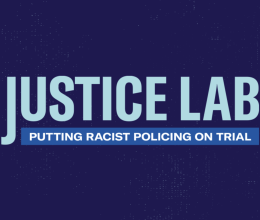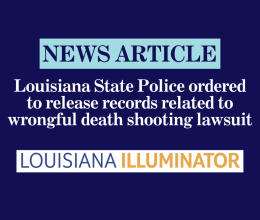WASHINGTON — The U.S. Supreme Court today lifted a temporary halt on a federal lawsuit challenging Louisiana’s discriminatory congressional maps. The action sends the case, Robinson v. Ardoin, down to the Fifth Circuit Court of Appeals for further consideration.
The lawsuit argues that the maps dilute the voting power of Black Louisianians in violation of Section 2 of the Voting Rights Act by failing to add a second majority Black district.
A federal judge, along with the Fifth Circuit Court of Appeals, previously ruled that the map was racially discriminatory, requiring legislators to draw a new map ahead of upcoming elections. The case came to a standstill last June when the Supreme Court granted Louisiana’s bid to temporarily halt the district court ruling and reinstate the discriminatory maps.
The Supreme Court’s action today comes in the wake of its recent decision in Allen v. Milligan (formerly called Merrill v. Milligan), which reaffirmed the legal framework that guides courts in evaluating challenges to redistricting plans under Section 2.
In March 2022, the Louisiana State Conference of the NAACP, Power Coalition for Equity and Justice, and individuals Press Robinson, Dorothy Nairne, E. René Soulé, Alice Washington, and Clee Ernest Lowe filed the lawsuit challenging the Louisiana congressional plan. The plaintiffs are represented by the Legal Defense Fund, American Civil Liberties Union, ACLU of Louisiana, Harvard Election Law Clinic, Louisiana attorneys John Adcock and Tracie Washington, and Paul, Weiss, Rifkind, Wharton & Garrison LLP.
“The Supreme Court’s decision in Allen v. Milligan confirms that the disenfranchisement of Black voters by unfair, racially gerrymandered maps is an attack on our democracy," said ACLU of Louisiana Executive Director Alanah Odoms. “For voters of color to be fully included in our democratic processes, Louisiana’s congressional maps must accurately reflect our state’s population.”
“The Supreme Court was right to conclude that Alabama’s maps violate the Voting Rights Act. Louisiana’s maps do the same thing, and should also be struck down,” said Sarah Brannon, managing attorney with the ACLU’s Voting Rights Project.
“The Supreme Court’s decision to uphold Section 2 of the Voting Rights Act recognizes that attacks on the voting rights of people of color continue,” said Stuart Naifeh, an attorney with the Legal Defense Fund. “Louisiana’s efforts to limit the voting power of Black Louisianans mirrors Alabama’s, and the court’s decision leads to only one conclusion: Louisiana’s congressional map must be struck down. Black people make up one-third of Louisiana’s total population, and this case presents an opportunity to create two out of six congressional districts where Black voters can have their voices heard. Black Louisianians have faced generations of discrimination in political representation, and this litigation can finally chart a more hopeful direction for the state and our nation’s promise of democracy. There is no reason for the state to continue wasting taxpayer dollars fighting this losing battle. It’s time for fair maps.”
The Supreme Court’s decision will allow the case to proceed in advance of the 2024 congressional elections in Louisiana. The current maps severely dilute Black voting power by packing Black voters from New Orleans and Baton Rouge into a single U.S. congressional district, whereas in actuality, Black Louisianians make up roughly one-third of the state.
“The Supreme Court’s ruling upholding Section 2 of the Voting Rights Act was welcome news for Black voters in Louisiana who, for decades, have been in a single district that has diluted the power of their vote and the ability to elect candidates of our choice,” said Mike McClanahan, president of the Louisiana Conference of the NAACP. “As in Alabama, the people of Louisiana have the law on their side and the facts on their side. But the fight doesn’t end here — it’s time for a new map with two majority-Black districts that will finally honor Black voters’ right to fair representation.”
“We are optimistic about the future of fair maps in Louisiana,” said Ashley Shelton, founder and president/CEO of Power Coalition for Equity and Justice. “At every stage of the redistricting process, we worked with community members across the state to ensure their voices were heard. Their message could not have been clearer: They wanted fair maps that represent all of Louisiana’s communities and no longer deny Black voters an equal opportunity to elect candidates of their choice. We are eager to see this legal process play out in the judiciary and have renewed hope after the Supreme Court’s order. The promise of fair representation has been the North Star guiding our work on behalf of voters in Louisiana and we are ready to finally reach it.”
Learn more about the lawsuit here.






